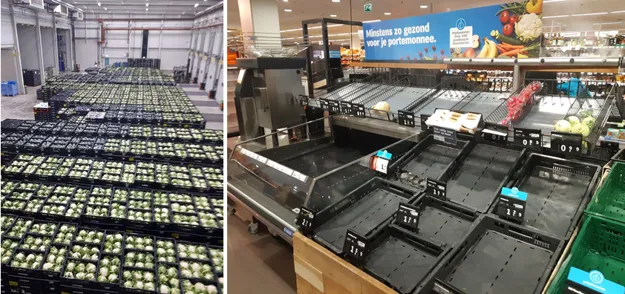Empty shelves in the fruits and vegetables aisles and a demand that equals that of Christmas and Easter, and at the same time through the roof, the floricultural market has collapsed due to the COVID-19 outbreak. Another challenge on the horizon is that of labour. The horticultural industry in general relies greatly on international workers and the travel limitations could become a serious issue - especially now that on a global scale, workers showing symptoms of possible contamination are advised to stay home.
Migrant workers
“I’ve been on the phone all morning and with this Covid-19 virus and people not being allowed into the country, the farming community in B.C. is in a panic because there’s so many farmers that rely on the arrival of migrant workers from Mexico and Central America. Suddenly they’re asking what’s going to happen now because their workers will have a hard time entering Canada and if they do enter they’ll have to go into two weeks of self-isolation just like all the rest of us. It’s a big issue right now for farmers in B.C.,” said Ian Paton from Delta South to the Delta Optimist.
Also in New Zealand the effects become clear. The industry there greatly relies on backpackers and workers from the Pacific, through various schedules & schemes. Since there will be a shortage of these workers, the industry now looks at other industries to possibly attract workers from. Forestry, for example, sine many workers have lost their jobs due to the outbreak as well. The head of the NZ Forest Industry Contractors Association, Prue Younger, welcomed moves by farmers and growers to take on forestry workers - but said forestry contractors were loath to lose skilled staff.
The situation in Australia is the same. The Federal Government's announcement that all people arriving in Australia, including citizens, must self-isolate for a fortnight could have implications for agricultural workers. "We're starting to have those conversations around making sure we've got flexibility in that labour supply so we can get those products off the trees", Queensland University of Technology retail expert Gary Mortimer said.

Shortages of food? No sir!
There's more going on in the world at the moment. Due to the outbreak, people started stocking up food - including fresh foods and vegetables. Empty supermarket shelves are appearing all over the world. CEO Steven Martina of Dutch fruit & vegetable trading company The Greenery shows deep respect for all growers and employees of the company, who are currently fully committed to getting fresh fruit and vegetables together with the employees of our retail partners in the supermarkets during this uncertain period of the coronavirus. "The volumes exceed Easter and Christmas, but we are used to being able to switch quickly and have sufficient capacity at our distribution centers. Hoarding is therefore unnecessary and even undesirable as long as we run the chain with respect for the health of all employees."
Shifting operations
Also in New York, where the team of Square Roots Grow has their vertical farm, this is the situation. "Sooner rather than later, food supply will surely become an issue. So it feels like we have a moral obligation to use the resources we have—skilled farmers and our farm-tech platform—to keep growing food, and to find ways to get that food to as many people as possible", they say. Yet they made sure to adjust to the new standard.
"This weekend, we have assessed all our processes to determine what changes we can immediately make to ensure our focus is on growing food while still doing our part to flatten the curve. For example, we have decided to stop the time-intensive and people-intensive task in our current process of packing harvested food into small clam shells, ready for retail distribution. Instead, we are going to pack quickly in bulk bags (as always, with gloves and love). Additionally, for now, we are also ceasing “high touch” e-trike distribution from our operations until further notice. By making a series of similar changes—i.e. prioritizing the actual growing of food over the wider spectrum of tasks required to run a seed-to-shelf, vertically integrated food business—we can manage our farms without compromising food safety with a much smaller team. And we can safely engineer new workflows in the farm where social distancing needs are met. Any farmers or other staff not absolutely required to manage this temporary, slimmed-down operation, have been asked to stay at home on full pay." In addition, instead of supplying the retail, the company now supplies ReThink meal supplier. Read more about this plan here.
Local for local?
Brian Filipowich, chairman of the Aquaponics Association, says the pandemic is: it is at risk from disruptions like pandemics, extreme weather events, military events, and economic or political upheavals.
"This pandemic shows that we need to invest in local agriculture to boost our supply of local, reliable food. Aquaponics, hydroponics, and controlled-environment agriculture can produce large amounts of food with minimal space and resources. These water-based growing methods do not require soil and can be practiced from arid deserts to urban rooftops", he says. "An American consumer can find similar prices for a tomato grown 100 miles away and a tomato grown in another country 2,000 miles away. But during a global travel ban or category 5 hurricane, your local tomato will still be there. How do we account for this benefit during the good times, so that there are enough local growers to support us during possible disruptions? Economies across the globe must find ways to value the hidden benefits of local, efficient agriculture to encourage more local growing. There will always be another coronavirus-type event, let’s make sure we have a reliable supply of local food for it."
